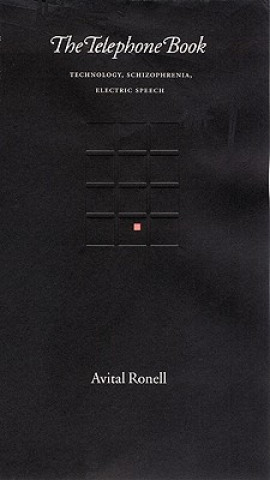
Kézbesítés
Vásárlási tanácsadó





Nem vált be? Semmi gond! Nálunk 30 napon belül visszaküldheti
 Ajándékutalvány
bármilyen értékben
Ajándékutalvány
bármilyen értékben
Ajándékutalvánnyal nem nyúlhat mellé. A megajándékozott az ajándékutalványért bármit választhat kínálatunkból.
Telephone Book
 Angol
Angol
 153 b
153 b
30 nap a termék visszaküldésére
Ezt is ajánljuk


'Avital Ronell installs the telephone in the space of thinking Heidegger reserves for poetry and art, producing a series of reflections on philosophy, psychoanalysis and biography that may come to represent one of the most decisive readings of the technological since Heidegger' - "Substance" "With "The Telephone Book", the deconstruction of 'phonocentrism' takes an unheard-of turn: Heidegger and Derrida are joined by Alexander Graham ('Ma') Bell in a party line that leaves one's ears (and eyes) ringing. Working with an advanced form of optical fiber, Avital Ronell establishes scandalously clear connections between her long-distance callers, and through them, between the mediatic and the literary, the technological and the political, the historical and the philosophical. In the White and Yellow Pages that result, 'criticism' catches up with the telephone and becomes rigorously colloquial' - Samuel Weber, "International Operator".'To think technology is not to think technology away. Avital Ronell calls us from afar. She does not think the question concerning technology by submitting it merely to evaluation, as has been done so often and so poorly. Rather, she seeks out what 'thinks' in technology and what is 'technological' in thinking. Her concern is located not in the instrumentality of technology with its good and bad points, but in unfolding the presence of technology in discourse, as discourse, or as the silence hidden within discourse. For example, when Heidegger refers to a telephone call whose political stakes are anything but indifferent, how is the 'call' of 'conscience' thereby implicated?The telephone serves here to open a line of inquiry, producing a series of analyses, eliciting a totally unprecendented style, whose general rule would be: how technoogy stimulates metaphorization, how it transports beyond itself, and gives way to thinking. That in the end it should bear something of the feminine, or that the mode of transport may itself be feminine (la tele-phonie), is the message waiting on our answering maching. Beep. Click. Blurb' - Jean-Luc Nancy, University of Strasbourg, France.The telephone marks the place of an absence. Affiliated with discontinuity, alarm, and silence, it raises fundamental questions about the constitution of self and other, the stability of location, systems of transfer, and the destination of speech. Profoundly changing our concept of long-distance, it is constantly transmitting effects of real and evocative power. To the extent that it always relates us to the absent other, the telephone, and the massive switchboard attending it, plugs into a hermeneutics of mourning. "The Telephone Book", itself organized by a 'telephonic logic', fields calls from philosophy, history, literature, and psychoanalysis.It installs a switchboard that hooks up diverse types of knowledge while rerouting and jamming the codes of the disciplines in daring ways. Avital Ronell has done nothing less than ocnsider the impact of the telephone on modern thought. Her highly original, multifaceted inquiry into the nature of communication in a technological age will excite everyone who listens in.The book begins by calling close attention to the importance of the telephone in Nazi organization and propaganda, with special regard to the philosophy of Martin Heidegger. In the "Third Reich" the telephone became a weapon, a means of state surveillance, 'an open accomplice to lies'. Heidegger, in "Being and Time" and elsewhere, elaborates on the significance of 'the call'. In a tour de force response, Ronell mobilizes the history and terminology of the telephone to explicate his difficult philosophy. Ronell also speaks of the appearance of the telephone in the literary works of Duras, Joyce, Kafka, Rilke, and Strindberg. She examines its role in psychoanalysis - Freud said that the unconscious is structured like a telephone, and Jung and R. D. Laing saw it as a powerful new body part. She traces its historical development from Bell's famous first call: 'Watson, come here!'Thomas A. Watson, his assistant, who used to communicate with spirits, was eager to get the telephone to talk, and thus to link technology with phantoms and phantasms. In many ways a meditation on the technologically constituted state, "The Telephone Book" opens a new field, becoming the first political deconstruction of technology, state terrorism, and schizophrenia. And it offers a fresh reading of the American and European addiction to technology in which the telephone emerges as the crucial figure of this age. Avital Ronell is an associate professor of comparative literature at the University of California, Berkeley. Her first book, "Dictations: On Haunted Writing" (1986), treats Goethe's invention of remote control in writing.
Információ a könyvről
 Angol
Angol




 Hogyan vásároljunk
Hogyan vásároljunk




























